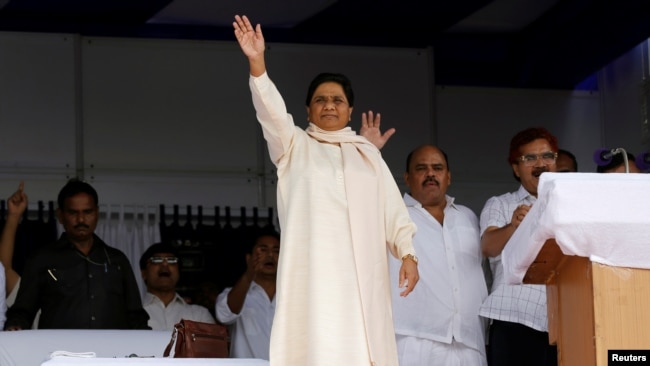In an increasingly acrimonious election campaign in India, two top leaders of the ruling Bharatiya Janata Party and two from the opposition have been temporarily banned from campaigning for making divisive speeches playing to religious bases. The bans, imposed by the country’s election watchdog, come amid growing concerns that inflammatory rhetoric and hate speech is fanning religious polarization as India holds its mammoth general election, VOA news reports.
The staggered election that continues until May 19 is a bitter and tough contest between Prime Minister Narendra Modi’s Hindu nationalist BJP, the opposition Congress Party and an array of regional parties.
A firebrand Hindu cleric who heads India’s largest state, Uttar Pradesh, Yogi Adityanath, cannot campaign for three days starting Tuesday for telling supporters that the BJP’s opponents had “faith in Ali [the son-in-law of the prophet Muhammad], we have faith in Bajrang Bali [a Hindu god].” The Election Commission ruled that the speech was “highly provocative” and likely to create hatred between religious communities.
The hardline Adityanath is a star campaigner for the BJP and his state Uttar Pradesh is a key prize that could decide whether the party wins its reelection bid. In earlier headline-grabbing remarks, he said in a reference to Muslims that a “green virus” is set to “engulf the nation.”
The BJP Cabinet minister for women and social welfare, Maneka Gandhi, was slapped with a two-day ban for her speech that if Muslims did not vote for her, “then when a Muslim comes to me for work, I will think, let it be, how does it matter?”
Mayawati, a leader of the powerful Bahujan Samaj Party based in Uttar Pradesh that draws its support from India’s low castes, was barred from campaigning for her call to Muslims to vote for her party and its alliance partner to defeat the BJP.
A leader of a party allied to Mayawati’s party, Azam Khan, was penalized for saying his BJP opponent, a Bollywood actress, wore “khaki underwear,” a reference to the brown shorts that are the uniform of the Rashtriya Swayamsevak Sangh, the ideological wing of the BJP.
The bans were imposed after the country’s top court criticized the country’s powerful Election Commission for failing to stop politicians from flouting strict election rules that forbid the use of religion or caste to solicit votes in a country where such divisive comments have the potential to unleash communal violence.
A string of inflammatory remarks on the election trail have raised concerns that political leaders, particularly from the ruling BJP, are relying on firing up voter bases rooted in religion or caste to swing an election which according to polls it can only win narrowly.
That is because the campaign, say analysts, lacks a positive agenda of the kind seen in 2014 when Prime Minister Narendra Modi’s promise of inclusive development gave his Hindu nationalist party a decisive mandate. But this time there is widespread disenchantment that its economic agenda was slow to bring benefits to the country of 1.3 billion people, particularly the economically disadvantaged.
“This election does not have a grand narrative. Neither the government has been able to create a grand narrative nor has the opposition,” says political analyst Ajoy Bose. “So with this election being very bitterly contested, I am not surprised that this kind of narrow, sectarian, religious appeal is going out because the development slogan is not working for the BJP.”
The BJP has been calling its opponents “soft on terrorism” and accusing them of appeasing Muslims, India’s largest minority who make up about 14 percent of the population.
The opposition Congress Party has not hesitated from pulling punches either. Alleging corruption in a deal to buy fighter jets from France, its leader, Rahul Gandhi, has been repeatedly calling Prime Minister Modi a “thief” during campaign speeches and asking crowds to repeat his slogan, “The Watchman [Modi] is a thief.” The Supreme Court has asked him to explain why he incorrectly attributed remarks to the court saying that Modi had “committed a theft.”
For the Election Commission, the task of ensuring fair conduct has been more challenging than ever earlier considering the scale of poll violations. “Everywhere the kind of speeches, the slogans raised are fairly inflammatory and sectarian. And if they really follow it to the letter there may be no election,” rues Bose. “But hopefully, this crackdown will serve as a warning to campaigners and leaders to diffuse the very, very ugly, narrow atmosphere that has been built up in these elections.”

